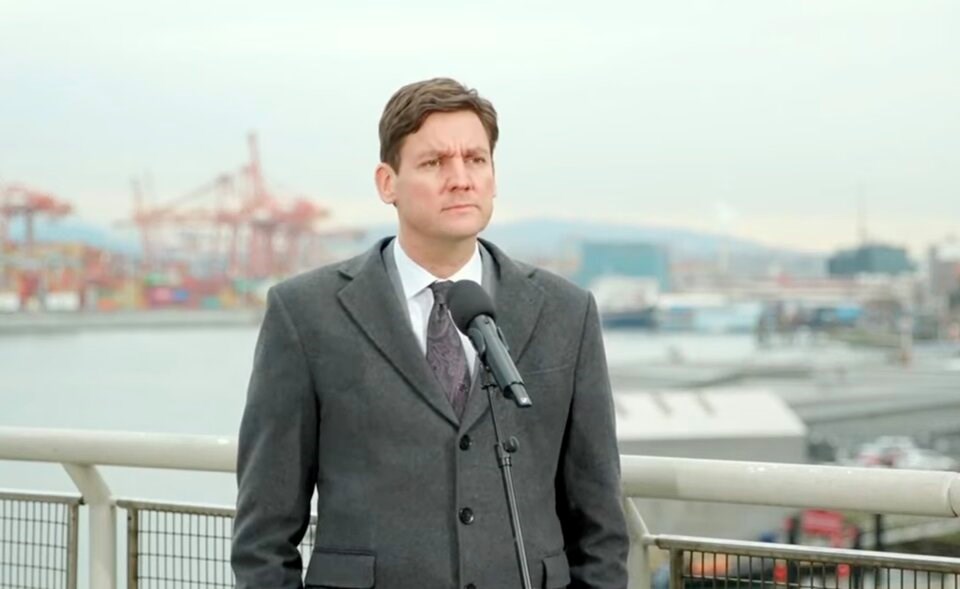British Columbia’s premier says “everything is on the table” should Canada be forced to respond to potentially crippling tariffs threatened by the United States.
At a press conference Tuesday, Premier David Eby said his government is working with the business community and First Nations to co-ordinate a response U.S. President Donald Trump’s threat to slap a 25 per cent tariff on all Canadian goods.
“It's moments like these where you have a choice — you can surrender and give up, or you can stand up. And for British Columbia, we're going to stand up. We're going to respond to tariffs,” said Eby.
“We will respond in kind, and they will feel it.”
Last week, Eby’s government released an assessment of how a 25 per cent tariffs on all Canadian imports would impact the province. The preliminary assessment found B.C. would see the loss of 124,000 jobs and $69 billion in economic activity over the next three years.
On Tuesday, Eby said B.C.’s side of a Canadian levy package could extend to U.S. alcohol, electricity sent down the West Coast, bidding on government contracts, and even charging American trucks travelling through the province to supply Alaska.
When it comes to making travel plans, the premier said Canadians might want to reconsider supporting a country launching a “deliberate economic attack on families in our province.”
He added: “We should really be thinking carefully about spending our money in that country.”
The province’s strategy to weather potential tariffs includes diversifying B.C.’s trading relationships in other parts of the world, including looking at re-opening trade offices in Asia, said Eby.
In the lead-up to Eby’s remarks, another high-profile leader said he would reverse his position on a controversial pipeline project in light of Trump’s threats.
Grand Chief Stewart Phillip, president of the Union of BC Indian Chiefs, said he would no longer oppose the Northern Gateway pipeline project — scrapped in 2016 — that would have created another route for Alberta's oil to get to the Pacific Ocean.
"I would suggest that if we don't build that kind of infrastructure, Trump will — and there will not be any consideration for the environment or the rule of law or anything along those lines,” Stewart said at a news conference.
The comments came after a tumultuous Monday in Washington, D.C., as Trump was sworn in and quickly signed a blitz of executive orders — calling on the military to patrol the U.S. border, withdrawing from the Paris climate agreement and World Health Organization, and pardoning most of the 1,600 rioters charged after storming the U.S. Capitol on Jan. 6, 2021, during the certification of previous U.S. election.
Earlier that same day, the U.S. president made little mention of Canadian tariffs, raising hopes among some Canadian officials that the threats would be placed on hold. But later Monday, Trump suggested he wants a 25 per cent tariff in place by Feb. 1, renewing threats of a trade war.
In an executive order, he ordered a new “America First” trade policy that directs officials to study how Canada, Mexico and China are allowing a "vast number" of people and fentanyl to come into the United States.
Between October 2023 and September 2024, 20 kilograms of fentanyl were seized at the U.S.-Canada border, a fraction of the 9,930 kg seized across all U.S. borders. And over that same period, 198,929 people were classified as apprehended or expelled at the U.S.-Canada border — 6.8 per cent of the 2.9 million apprehensions and expulsions at all U.S. borders, according to the Canadian Press.
Should Trump follow through with his tariff plan, the Canadian government said it would slap levies on $37 billion worth of goods bound for the United States. That would rise to $110 billion if the dispute continues.
At a federal cabinet meeting in Montebello, Que., Tuesday, Prime Minister Justin Trudeau said that if Trump wants to usher in a "golden age" for the United States, he will need the energy, critical minerals and resources that Canada is ready to provide.
In lockstep with Eby, Trudeau said “everything is on the table” if the U.S. president doesn’t back down.
"Our response will be robust and rapid and measured, but very strong. The goal will be to get those tariffs off as quickly as possible," Trudeau said.
With files from the Canadian Press



